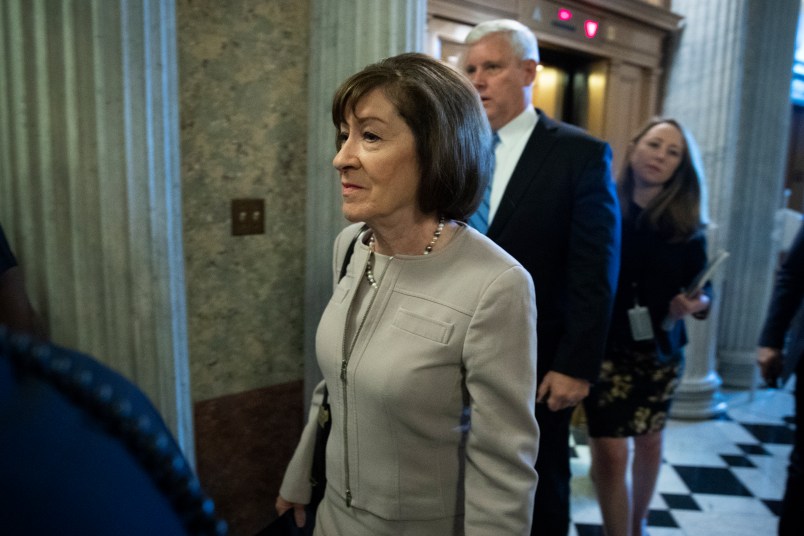Sen. Susan Collins (R-ME) announced Friday she would vote to confirm Brett Kavanaugh, in a final vote slated for Saturday afternoon, all but guaranteeing the judge will be on the Supreme Court bench by the beginning of next week.
Collins had voted to advance him an a procedural vote earlier Friday but had said she wasn’t announcing her final vote until later in the afternoon, leaving an air of uncertainty around the final vote count.
Her announcement essentially brings to close what was a bitter and dramatic confirmation fight, which took perhaps the darkest turn when a number of women stepped forward with sexual misconduct allegations. Barring any dramatic developments overnight, Saturday’s final confirmation vote, slated for the afternoon, is in effect a formality.
Of Dr. Christine Blasey Ford, Kavanaugh’s accuser who testified before the Senate Judiciary Committee, Collins said, “I found her testimony to be sincere, painful and compelling. I believe that she is a survivor of a sexual assault and this trauma has upended her life.” But she continued to claim that not one of the four people who Blasey Ford said were at the gathering where the assault allegedly occurred could corroborate her account.
“I do not believe that these charges can fairly prevent Judge Kavanaugh from serving on the court,” Collins said.
GOP leaders were able to secure Collins’ vote after facilitating an FBI investigation into the sexual misconduct claims against Kavanaugh — though one that Democrats have criticized as meager and incomplete.
Even before the sexual assault allegations, which Kavanaugh vehemently denied, Collins was a closely watched vote due to her ostensible support of abortion rights. Kavanaugh will replace Justice Anthony Kennedy, who often broke from the court’s conservative block to protect women’s access to abortion.
Yet throughout the process, Collins signaled that Kavanaugh had privately and publicly given her enough assurances that he would respect Supreme Court precedent on Roe v. Wade, the decision that made abortion legal, and would not seek to overturn it.
Anti-abortion groups never wavered in their vociferous support of Kavanaugh, and on Friday were still blasting press releases calling for his confirmation. President Trump, during the 2016 campaign, said that if he gets two or three justices on the court, a reversal of Roe “will happen” and it “will happen automatically in my opinion because I am putting pro-life justices on the court.”
Collins in the past has broken with her party in favor of abortion rights, voting against standalone measures to defund Planned Parenthood, as well as against Obamacare repeal bills, in part because they sought to hobble reproductive services for women.
Kavanaugh, as an appeals court judge, wrote opinions seeking to impede an undocumented immigrant minor from obtaining an abortion. He also gave a speech last year filled with dog whistles suggesting he was ready to roll back Roe.
Collins told reporters last month that Kavanaugh’s comments to her about precedent had convinced her he wouldn’t overturn Roe, and that she did not consider the more incremental abortion cases — specifically Whole Women’s Health, where the Supreme Court stopped Texas from closing scores of clinics through regulations — not the same as reversing Roe.
Collins’ crucial support for Kavanaugh could have major ramifications for her own political fortunes. Democrats’ fury at her vote here as well as her support of the GOP tax cuts all but guarantee they’ll try to mount a serious challenge to her, something they haven’t done since she first won her seat in 1996.
Collins hasn’t faced a competitive race since then, largely because of her strong appeal to moderates and Democratic-leaning female voters, and two years is a long time — this vote could fade into the past. But in the current hyper-polarized era, Democrats will unquestionably take a shot at ousting someone who provided the key vote for a nominee they hate so deeply in a state a GOP presidential nominee hasn’t won since 1988.
Correction: Collins first won election to the Senate in 1996, not 1994 as originally reported.







“OK … let’s see here … who ordered the whirlwind?”
Fucking coward. Take your assurances and shove them.
Wait wait you mean Collins voted with the GOP?! I’m shocked! Shocked I tell ya!
Seriously, i hope that organization of women that started collecting money for her opponent in 2020 goes hard core after this.
Only fix for this is 2020, taking House, Senate and White House and expanding the court to 11 or 13 and loading it with young super liberal judges as a Giant Fuck You to the GOP and Trumpers.
Again, this was never in doubt. Anyone who thought otherwise needs to take a peak behind the curtain and see what the “wizard” is up to. Susan Collins repeated virtually every right wing talking point about Kavanaugh. She was always onboard with this nomination. And for those who think this was merely a political decision… well, yeah it was. However, I have no doubt that she has convinced herself that she is doing “the right thing” too. Such is the power of motivated reasoning.
Not a coward. A repug, conservative, freakazoid anti-abortion tool as long as she’s been in the Senate. The question is why anyone ever thought she was anything different.